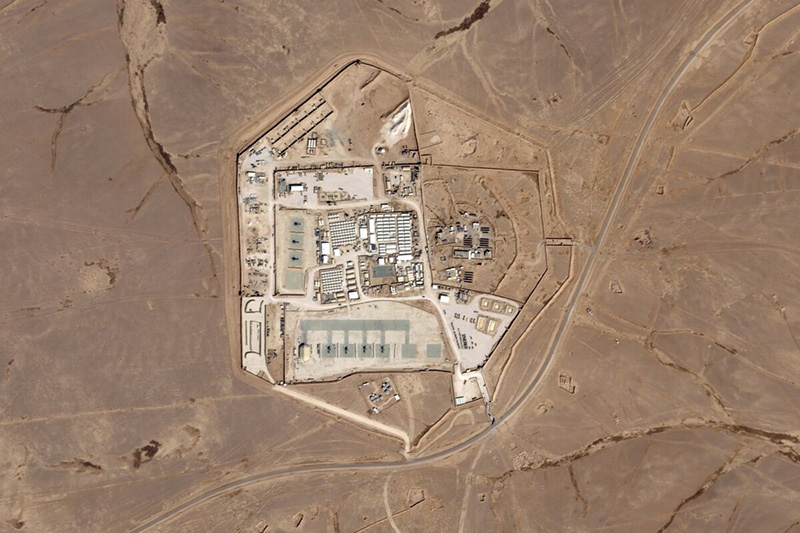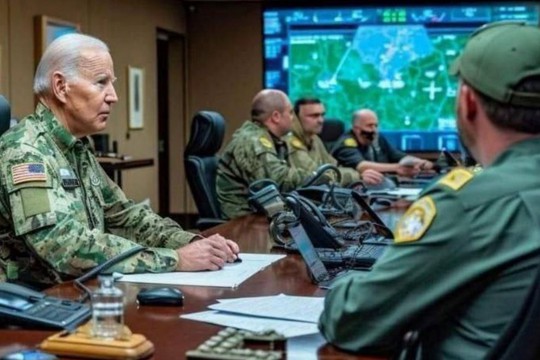President Biden in uniform at the operation control center.
The White House said it’s weighing potential responses to a deadly attack on a US base in Jordan by Iran-backed militants over the weekend, as both Washington and Tehran seek to avoid a direct confrontation over the widening Middle East conflict.
President Joe Biden is facing mounting pressure to respond to the drone assault, which killed three US soldiers and wounded dozens of others. They were the first Americans to die from such an attack since regional tensions were inflamed by the start of the Israel-Hamas war in Gaza in October.
Biden is “working through” options, National Security Council spokesperson John Kirby told NBC on Monday, reiterating that the US doesn’t want a “wider war” with Iran.
On Sunday, the president didn’t directly blame Tehran, but said the attack “was carried out by radical Iran-backed militant groups operating in Syria and Iraq.”
“We will hold all those responsible to account at a time and in a manner of our choosing,” he said.
Iran said any suggestion it was responsible was “baseless” and insisted the groups act independently.
“Resistance groups in the region do not take orders from the Islamic Republic,” Foreign Ministry Spokesman Nasser Kanaani said. He was referring to what’s often called the “axis of resistance” — a network of militias in territories from Yemen to Iraq and Gaza that are supported by Tehran and share its opposition to the US and Israel.
The challenge for Biden is how to retaliate without raising oil prices and without getting drawn further into the conflict – and especially into a direct confrontation with Iran – in an election year.
Higher crude prices would likely sting American consumers by pushing up the cost of gasoline, a politically sensitive topic.
“The US faces bad options only,” said Firas Modad, head of Modad Geopolitics, a risk-advisory firm. Biden’s under “immense pressure” to respond to the deaths in Jordan but a direct conflict with Iran would likely result in higher energy prices and significant casualties, he said.
Tehran faces its own balancing act. It openly supports militias across the region like Hezbollah and the Houthis, who’ve roiled the shipping world with their attacks in the Red Sea. But it has always rejected the idea that these proxies act under its command and it is wary of escalating tensions with the US to the point of triggering a direct conflict.
 The military base Tower 22 in Jordan.
The military base Tower 22 in Jordan.
Photo: Planet Labs PBC/AP
The death of the service members in Jordan adds to rising Middle East tensions just as the 2024 voting begins, writes POLITICO.
The weekend explosion at a base in Jordan near the Syria border was a moment the Biden administration has been dreading since the beginning of the Israel-Hamas war. American military lives were lost for the first time in the region since Oct. 7, and pressure instantly was placed on the White House to respond.
But that matter in which that response is made risks further inflaming the Middle East, which Secretary of State Antony Blinken on Monday said was at its “most dangerous since 1973.” In recent weeks, the White House has ordered up a series of air strikes against Houthi militants in Yemen while warily watching the fallout from explosions in Iraq, Iran and Pakistan. And Biden’s aides have felt growing frustrations with Israel’s conduct of the war in Gaza, while their fears also rise about support for Ukraine drying up as it tries to hold off Russia.
Biden, who has a well-known desire to limit conflict and avoid dragging the United States into another Middle East war, has directed his team to draw up military options in response to the weekend attack.
Among the options on the table for the Pentagon: striking Iranian personnel in Syria or Iraq or Iranian naval assets in the Persian Gulf, according to the officials. The Iranian government, for its part, has suggested that a strike on Iran itself would be a red line. The officials suggested that, once the president gave the go-ahead, the retaliation would likely begin in the next couple of days and come in waves against a range of targets.
Jeremy Bash, former chief of staff at the CIA and Pentagon, said Biden “cannot avoid the international challenges even in an election year.” Though Bash argued the president’s experience on the world stage could make that a strength, he added: “There is a sense that our deterrence measures to date have not been received by Tehran as we hoped, so escalation is unavoidable.”
The deaths of the U.S. service members further changed the calculus. Several Republicans declared that the militants were emboldened to attack because Biden’s previous responses were too modest, and some suggested that a strike with Iran itself was needed.
Some Democrats close to the president believe he has become unavoidably bogged down on foreign affairs — including trying to manage Israeli Prime Minister Benjamin Netanyahu, who has frustrated the White House with his conduct of the war. Though Sunday’s attack will place further strain on Biden, his senior advisers believe that foreign policy presents an opportunity to show his decades of experience, which they believe they can contrast with Trump.
But while affairs overseas don’t often determine presidential elections, there is a risk that rising tumult abroad could prompt voters to seek change at home. Polling suggests portions of the Democratic base — including young voters, voters of color and progressives — disapprove of Biden’s support of Israel during the war and believe he has not done enough to limit the civilian casualties in Gaza.
Biden’s support for Israel has hurt the campaign badly with the sizable Arab-American population in Michigan, and his team is scrambling to find other paths to victory in the battleground state, according to two campaign advisers granted anonymity because they aren’t authorized to speak publicly about strategy.
A president’s most valuable resource is his time, but Biden aides noted that White Houses are designed to handle multiple challenges at once — both foreign and domestic. Meanwhile, Republicans in Congress continue to stand as an obstacle to the administration’s efforts to support Ukraine, notes POLITICO.
read more in our Telegram-channel https://t.me/The_International_Affairs

 12:10 31.01.2024 •
12:10 31.01.2024 •























